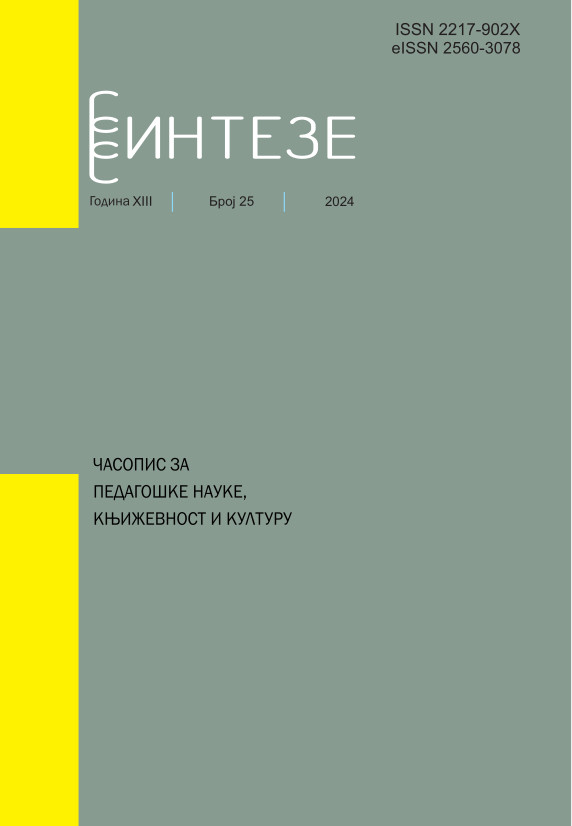Possibilities and importance of applying learning through research with children in the community - pre-school teacher's perspective
Abstract
Starting from the perception of a child as a researcher from the very birth, the research nature of his/her learning, the importance of the community for the learning and development of a preschool child, the goal of this research is to consider pre-school teachers' perspective and learning opportunities through research with children in the community. The research used the method of theoretical analysis and the descriptive method and two research techniques: scaling and content analysis of pedagogical documentation. The following research instruments were used: an assessment scale and a protocol for the analysis of pedagogical documentation. Twenty pre-school teachers participated in the research. The content sample consisted of nine stories on topics/projects. The research indicates that learning through research with children in the community is integrated into the educational process, that pre-school teachers recognize and know the value of this approach and that they mostly have the support of the community. The importance is also highlighted of recognizing challenges through reviewing practice and dealing with them in order to work continuously on improving learning through research with children in the community.
References
Brunton, P. & Thornton, L. (2010). Science in the Early Years: Building Firm Foundations from Birth to Five. London: SAGE.
Dowdell, K., Gray,T. & Malone, K. A. (2011). Nature and its Influence on Children's Outdoor Play. Australian Journal of Outdoor Education, 15(2), 24-35.
Golubović – Ilić, I. (2020). Dete-istraživač – aktivni učesnik u svom razvoju. Uzdanica, 17 (2), 295-311.
Крњаја, Ж. и Павловић Бренеселовић, Д. (2022). Водич за развијање теме/пројекта са децом. Београд: Министарство просвете, науке и технолошког развоја.
Malaguzzi, L. (1998). History, Ideas, and Basic Philosophy – An Interview with Lella Gandini. U: Edwards, C. P., Gandini, L., Forman, G. (ur.), The Hundred Languages of Children – The Reggio Emilia Approach, Advanced Reflections. London: Ablex Publishing, str. 49-97.
McClain, C. & Vandermaas-Peeler, M. (2016). Outdoor explorations with preschoolers: An observational study of young children’s developing relationship with the natural world. The International Journal of Early Childhood Environmental Education, 4(1), 37-53.
Miljak, A. (2009). Življenje djece u vrtiću. Zagreb: SM Naklada d.o.o.
Ontario Institute for studies in Education (2011). Natural Curiosity: Building Children’s Understanding of the World through Environmental. Toronto: University of Toronto.
Pavlović Breneselović, D., Krnjaja, Ž. (2017). Kalidoskop: osnove diversifikacije programa predškolskog vaspitanja. Beograd: IPA.
Pravilnik o Osnovama programa predškolskog vaspitanja i obrazovanja (2018). Sl. glasnik RS - Prosvetni glasnik", br. 16/2018.
Pravilnik o Standardima kompetencija za profesiju vaspitača i njegovog profesionalnog razvoja (2018). Sl. glasnik RS - Prosvetni glasnik", br. 88/17 и 27/18.
Slunjski, E. (2011). Razvoj autonomije djeteta u procesu odgoja i obrazovanja u vrtiću. Pedagogijska istraživanja, 8 (2), 217-230.
Stojanović, B. (2023). Projektni pristup učenju –iskustva vaspitača. Jagodina: Fakultet pedagoških nauka Univerziteta u Kragujevcu.
Travar, M. i Bozalо, S. (2021). Povezanost predškolskih ustanova i društvene sredine iz ugla kadrova u predškolstvu. Research in Pedagogy, 11 (2), 395-404.
Vujičić, L. i sar. (2017). Razvoj znanstvene pismenosti u ustanovama ranog odgoja. Rijeka: Učiteljski fakultet Sveučilišta u Rijeci, Centar za istraživanje djetinjstva.
Wilson, R. (2012). Nature and young children. Encouraging creative play and learning in natural environments. New York: Routledge.
Worth, K. (2010). Science in early childhood classrooms: Content and process. Early Childhood Research & Practice. Retrieved March 30, 2024. from http://ecrp.illinois.edu/beyond/seed/worth.html.
Copyright (c) 2024 Gordana M. Stepić, Marta D. Dedaj, Biljana M. Džaić

This work is licensed under a Creative Commons Attribution 4.0 International License.
Autori koji objavljuju u ovom časopisu pristaju na sledeće uslove:
- Autori zadržavaju autorska prava i pružaju časopisu pravo prvog objavljivanja rada i licenciraju ga "Creative Commons Attribution licencom" koja omogućava drugima da dele rad, uz uslov navođenja autorstva i izvornog objavljivanja u ovom časopisu.
- Autori mogu izraditi zasebne, ugovorne aranžmane za neekskluzivnu distribuciju članka objavljenog u časopisu (npr. postavljanje u institucionalni repozitorijum ili objavljivanje u knjizi), uz navođenje da je članak izvorno objavljen u ovom časopisu.
- Autorima je dozvoljeno i podstiču se da postave objavljeni članak onlajn (npr. u institucionalni repozitorijum ili na svoju internet stranicu) pre ili tokom postupka prijave rukopisa, s obzirom da takav postupak može voditi produktivnoj razmeni ideja i ranijoj i većoj citiranosti objavljenog članka (Vidi Efekti otvorenog pristupa).

